|
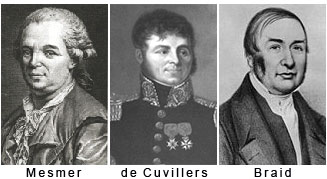
The
art of hypnosis has been around quite literally for thousands of
years, albeit under various forms and many different names. After centuries
of occult status in the Far East and the Middle East, it was German
physician Franz Anton Mesmer who has been credited for its introduction into western
society in the mid-late 1700s, under the errant notion of animal
magnetism. It was soon dubbed as "Mesmerism," however, it wasn't until the 1800s when
it would finally gain notoriety with the public and
academicians. The term
hypnotism is thought to have come from Scottish surgeon and magnetizer
James Braid, however, it was reportedly first coined by French magnetizer Etienne de Cuvillers
and then later adopted by Braid in 1841.
The terms hypnosis and hypnotism have remained to this day.
Early on its human value was
very intriguing to some of the forward thinkers in the medical field at the
time, but sadly enough there were others who held a deeper interest in its
potential
immoral value. Unfortunately a great many unscrupulous male
practitioners of the era were the first to recognize that hypnosis can be
used as an extraordinarily persuasive behavior modifier
and sexual control tool,
one that can be used deviously and immorally on unsuspecting women. There
were numerous reports of sexual abuse using hypnosis in the 1800's, so it
really shouldn't be a surprise to anyone that man today might possibly still
harbor those same fervent, yet deviant, carnal desires.
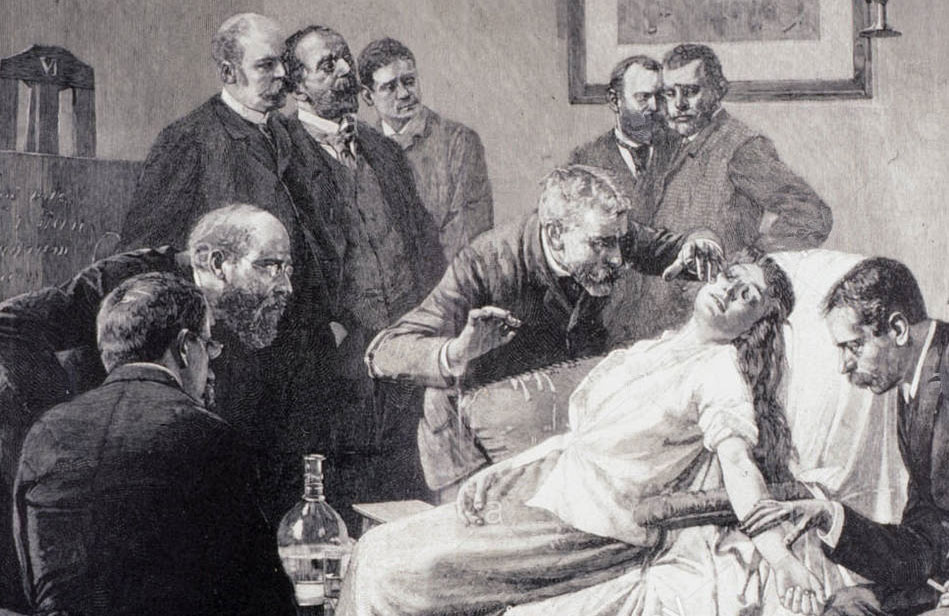
Hypnotism gained notoriety in the 1800's,
especially so for misuse against women.
The multitude of well documented,
sexual misconduct cases displayed on this page (shown at right), along with
the number of hypnosis facts also listed, should prove beyond any shadow of
doubt that this formidable tool is still being used to this day to
incapacitate and abuse women (and children) with.
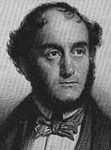 Over the years the acceptance of
hypnotism has had its many trials, but Scottish surgeon
James Esdaile
is one of many who are noted for
proving its medical viability
in the 1800's by using it as a
pain depressant,
instead of traditional anesthesia. He first did this in 1845 while
working for the East India Company. He was reported to have performed 345
such major surgeries. It was also used for dental procedures, and even for childbirth. Over the years the acceptance of
hypnotism has had its many trials, but Scottish surgeon
James Esdaile
is one of many who are noted for
proving its medical viability
in the 1800's by using it as a
pain depressant,
instead of traditional anesthesia. He first did this in 1845 while
working for the East India Company. He was reported to have performed 345
such major surgeries. It was also used for dental procedures, and even for childbirth.
As the reputation for hypnotism grew
to new heights in the 19th and 20th centuries, the field would eventually be
taken to new lows in the 1950's by the CIA, through its nefarious
MKULTRA mind control program and its ensuing, heinous
experimental programs, all of which focused specifically on the darker
science of
psychologically programming humans. This task was accomplished
through the involuntary repetitive brainwashing of test subjects,
along with rigorous stress related conditioning. This covert, illegal
program was deemed a huge success before reportedly being taken underground.
(see more on MKULTRA at
History.com)
An even darker aspect came about as an
offshoot of MKULTRA, through a program codenamed
Project Monarch, one which was reported to have created
programmed & conditioned sex slaves, to be used for political
blackmail and personal entertainment. (see:
Cathy O'Brien,
Brice Taylor,
Annie McKenna)
 The sex slave trade is a vast
and
growing dark enterprise.
One example would be a
2015 sting that yielded many people willing to buy a sex slave, despite
the fact they already knew it was illegal
and expressly against the girl's will. (Find more on this story
here and
here. See YouTube video
here.) This type of crime is very real. The sex slave trade is a vast
and
growing dark enterprise.
One example would be a
2015 sting that yielded many people willing to buy a sex slave, despite
the fact they already knew it was illegal
and expressly against the girl's will. (Find more on this story
here and
here. See YouTube video
here.) This type of crime is very real.
Consider the power of hypnosis for those
involved in
sex-slaves and trafficking, not to mention the porn industry. What is the
dollar value of having girls programmed to participate,
without resisting or trying to run away? A girl programmed against
her will, to be submissive. As horrible and humanly unfair as that sounds, it is
sadly enough very
possible through the use of hypnosis. (Despite being overtly inhumane,
morally wrong and highly illegal.)


Despite its long storied history,
there are still some nay-sayers who maintain that hypnosis is not even real,
however... the true fact of the matter is this, that the greater
preponderance of these deniers are people who have never ever been
successfully hypnotized in their life,
nor have they ever even taken the time to research the subject.
These doubters of hypnotism try as best as they can to deny the existence of
such a mysterious science, despite being grossly uneducated, and/or
blatantly ignorant in regards to the actual reality of this mental
phenomenon. This is very much akin to those who used to scoff at the notion
of string theory and quantum physics. (There also used to be a day when
people actually thought the earth was flat and the sun revolved around it.)
The 21st century truth of the matter
is this - that hypnotism is indeed regarded as very real, both
academically and in many scientific circles, and has been verified many
decades ago as a legitimate medical and psychological tool. In fact, a
2016 Stanford University research study has now identified physical
changes taking place inside the brain during hypnosis,
further cementing its standing in the scientific medical community as a very
real psychological tool.
 However, we are into a new millennium
and yet the hypnosis giants of the profession still cannot agree on how or why
hypnosis works, to this very day. We have many who will openly pontificate one way or the other, citing
study after study, but the truth of the matter is this... there is
still no
consensus opinion yet on this subject. As a matter of fact, they
can't even agree as to whether trance is a
non-state or an altered state of
consciousness, yet somehow there have been those willing to testify against rape victims
(even
a 14 year old girl) in a court of law on whether or not sexual
assault
under hypnosis is possible. (FYI, they were all wrong.) However, we are into a new millennium
and yet the hypnosis giants of the profession still cannot agree on how or why
hypnosis works, to this very day. We have many who will openly pontificate one way or the other, citing
study after study, but the truth of the matter is this... there is
still no
consensus opinion yet on this subject. As a matter of fact, they
can't even agree as to whether trance is a
non-state or an altered state of
consciousness, yet somehow there have been those willing to testify against rape victims
(even
a 14 year old girl) in a court of law on whether or not sexual
assault
under hypnosis is possible. (FYI, they were all wrong.)
Given such a mixed
opinion within the profession, it makes one wonder how anyone could have
felt certain enough to jeopardize the outcome of a court trial.
A great deal of what is currently
known by hypnosis experts is still very much speculation, supposition and conjecture, the three things that aren't
supposed to be allowed in a court of law. This environment exists primarily
because the researchers themselves are still trying to figure out the true
nature of hypnosis. As scientists and researchers try to sort out the
most relevant studies from the inconsequential or flawed studies, they have
yet to postulate a conceptualized theory that not only makes scientific
sense, but is something that everyone can finally embrace once and for all
as a basis for hypnosis.
We're literally just coming out of the dark ages
when it comes to hypnosis. It could very well be
compared to the space program era of the 1950's. We knew a few things about
space back then, but nothing at all like we now know today.
With that said, hypnosis researchers
have created an industry problem out of their own duplicity and/or
ignorance. They have myopically ignored the data at hand, the
overwhelming number of subjects abused under hypnosis, as they purport
to theorize why such abuse is impossible. As crazy as that sounds, it's
absolutely true and many hypnosis researchers have been doing it for years.
In a corporate research environment,
such a thing just doesn't happen. Tenacious researchers don't overlook the
elephant in the room and they don't throw the baby out with the bathwater,
as the hypnosis field has readily done for decades. When competent
researchers see an inordinate amount of data that points in one direction
(hypnosis rape), they don't look the other way, as hypnosis researchers have
done. Instead, the competent researcher embraces the data for what it is and
attempts to understand it and then explain it. A good researcher will
work to reconcile the data immediately, instead of conjuring theories
as to why the data should not exist. This has been the Achilles' heal
for the hypnosis profession for too many years. It seems clear that the
profession as a whole does not want to admit nor recognize that hypnosis can
indeed be used for
very dark purposes.
As a direct result, the single biggest
misconception to this day regarding hypnotism is the
powerful hold that it can actually have over people. There are still far too many
hypnosis professionals who naively and/or ignorantly claim that
"people under hypnosis won't do anything they wouldn't do in normal life."
This is absolutely, 100-percent
not true. As you read on, you will understand.
The originations of this brutal
fallacy stem from two noted historical figures from the hypnosis
community,
Martin Orne
and
Milton Erickson. These two men have
literally done more harm to hypnosis by getting one simple
thing absolutely wrong - the question of whether or not criminal or
antisocial behavior is actually capable from a subject who is under
hypnosis / in trance. These men are
perhaps the most responsible for propagating the idea that bad
things cannot happen under hypnosis. They couldn't possibly
have been any more wrong. The tragedy in all of this is
that a great many innocent women and children have suffered horribly over the years
as a direct result of this horrendously short-sided mistake by
two men that should have known better.
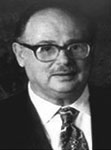 Before
delving into the world of hypnosis and trance, Martin Orne was
best known for his early pioneering studies into
demand characteristics, The Social
Psychology of the Psychological Experiment, which focused on the
issues of research participants being aware that they are part of a
psychological study and then still expecting them to behave as they would normally. Orne
believed that the research participants would always tell the researcher
what they wanted to hear, in the hopes of pleasing them. Unfortunately he
carried this same concept into his theories on hypnosis which led to some
wrongful assumptions. Orne mistakenly concluded that hypnotized people
were merely acting the exact same way that a person would under demand
characteristics. What Orne seemed to conveniently dismiss
was the fact that a cognitive research participant, acting freely under their own
volition, is greatly different from that of a hypnotized
subject. Orne's desire to learn about antisocial behavior under hypnosis,
by replicating other positive studies, fell prey to the influence from
his long held beliefs in demand characteristics. Before
delving into the world of hypnosis and trance, Martin Orne was
best known for his early pioneering studies into
demand characteristics, The Social
Psychology of the Psychological Experiment, which focused on the
issues of research participants being aware that they are part of a
psychological study and then still expecting them to behave as they would normally. Orne
believed that the research participants would always tell the researcher
what they wanted to hear, in the hopes of pleasing them. Unfortunately he
carried this same concept into his theories on hypnosis which led to some
wrongful assumptions. Orne mistakenly concluded that hypnotized people
were merely acting the exact same way that a person would under demand
characteristics. What Orne seemed to conveniently dismiss
was the fact that a cognitive research participant, acting freely under their own
volition, is greatly different from that of a hypnotized
subject. Orne's desire to learn about antisocial behavior under hypnosis,
by replicating other positive studies, fell prey to the influence from
his long held beliefs in demand characteristics.
In essence, Orne had made the very same mistake as Mesmer did 200 years before him,
by misguidedly carrying his previous research into his newer unrelated
research on the theories of hypnosis and trance. Orne's belief in demand
characteristics bias is as unrelated to hypnosis as Mesmer's
previous field of magnetism was. An argument could be made that both men
did not further the understanding of hypnosis, as much as they actually
hindered it.

When it comes to Milton Erickson, he
compounded the hypnosis argument by simply becoming one of the
greatest hypnotists ever known to humankind. Erickson was
revolutionary to the field and was extremely gifted in his
understanding of the art of hypnosis, however, his studies on
antisocial behavior under hypnosis were said to be remarkably poor
in their concept as well as their overall planning.
Many of his peers were quite adamant that Erickson's position was critically flawed right from the start, due
to his poor research protocols, most notable being his opposition stance
to altering a subject's perceptions when it came to encouraging
antisocial behavior under hypnosis.
While Erickson was said to have tested around 50
extremely somnambulistic subjects in 1939, he failed
miserably in his efforts to get them to perform criminal or antisocial behavior
because he did not do one extremely critical thing... he did not attempt to alter the perceptions of his subjects,
as did many other researchers who performed the same type of
experiments (Rowland, Wells, Watkins). Erickson simply
asked them to do immoral bad things straight away, at which point his
subjects became very agitated and uncomfortable, and they
understandably fought
and resisted.
Because of this monumental oversight, Erickson's research falls far
short when it comes to assessing the possibility of antisocial
behavior under hypnosis.
Author Samuel Glasner had this to say
about Erickson's experiments regarding the possibilities of
anti-social and/or criminal activity under hypnosis:
"As a matter of fact, anyone familiar
with the highly sophisticated techniques and daring conceptions which
Erickson uses in most of his experiments must be struck with the
unimaginative planning and impoverished methodology which he
used in these experiments on the antisocial use of hypnosis."
Suffice to say, because of the obvious shortcomings in conducting his research, Erickson was undeniably very wrong regarding the ability to use hypnosis for abuse or
criminal activity.
It has to be noted that a significant majority of their highly
credentialed peers at the time were adamantly opposed to the positions
of both Orne and Erickson, and yet the influence of two men who had it
all wrong somehow still lingers to this day. It's hard to argue
which of the two has had the worst influence on hypnosis, however,
due to his notoriety as a highly esteemed hypnotist, Erickson's views
apparently seem to carry the most weight to this day.
The
stance shared by these two notable hypnosis pioneers, Orne and
Erickson, on the issue of antisocial behavior under hypnosis,
was greatly juxtaposed by the following legendary hypnosis
researchers, who all stated unequivocally that hypnosis abuse is
absolutely 100%
possible.
In a 1949 article titled, The
Production of Antisocial Acts Under Hypnosis, Weitzenhoffer
stressed that in order to make someone commit a criminal act under
hypnosis, "perceptions must be distorted."
Success occurs 'when the subject does not perceive the situation as
being antisocial.' Watkins also came to the same conclusion during the
very same year. (reference)

It is indeed very ironic that Erickson and Orne,
two of the
field's most prominent hypnosis pioneers, are arguably the two most
responsible for today's current misunderstandings over hypnosis. Perhaps the fact that
both men were reportedly linked with the CIA has something to do with
that. (The possibility of a Manchurian Candidate has always
been a very hot topic and an extremely sensitive issue.) It's
understandable they would want to keep hypnosis a secret.
One other very significant influential critic
of hypnosis was Sigmund Freud,
who had difficulties grasping the nature of this new emerging
phenomenon. As a result, Freud had a very dim view of hypnosis and
was one of its biggest detractors. As such, he cast a negative
influence over the field of hypnosis for many decades. From the late 1800s
through early 1900s, many began to deny the power of hypnosis, as well as the notion of anti-social behavior
while under its influence, with Freud, Erickson and Orne having the most
negative impact.
The reality is, no matter how
credentialed they might have been at the time, those who denied the power of
hypnosis early on were 100% absolutely wrong.
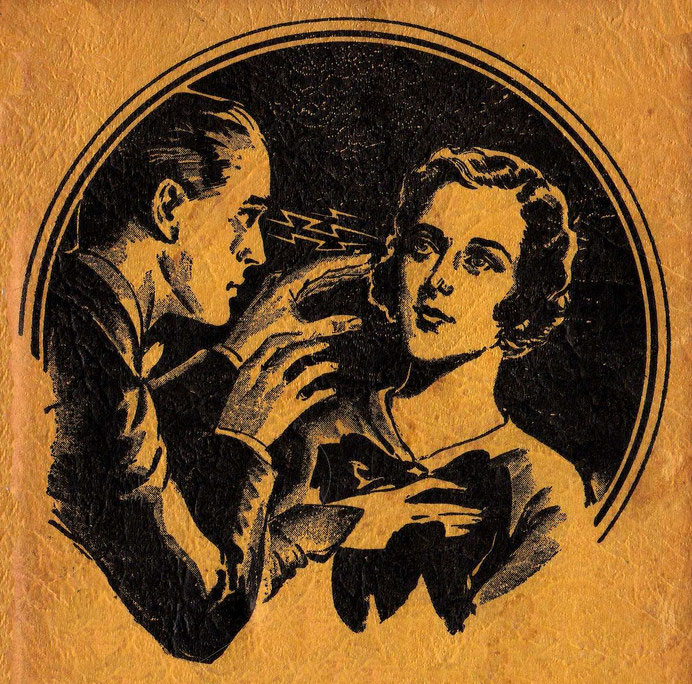 |
For the sake of argument, it is a
commonly known fact that even the most reserved or extremely shy person
will lose all their inhibitions under the influence of a simple
alcoholic beverage, doing and saying things they wouldn't normally
do, all because of the influence of alcohol. By contrast, hypnosis is
just as powerful as alcohol, but even more so, because
the brain is quite capable of operation under its influence,
while alcohol just makes you lose control and you forget everything.
|
The fact is, hypnosis can do
exactly the same thing as alcohol, by allowing a person to lose all of their
personal inhibitions upon a mere suggestion. This is something that has
been documented many times over for many decades, and is generally the
feature highlight of entertainment stage hypnosis.
Another close similarity with alcohol is
hypnotic amnesia. It is
absolutely possible to have a
subject do things under hypnosis without ever remembering doing them.
It is
entirely possible to make
someone forget sexual abuse under
hypnosis by using it to also block all recollection of the event. The
memory is still in the subconscious, but it can be repressed,
making it very difficult for them to even recognize any signs of sexual abuse. (See
Hypnotic Amnesia, below right.)
The list on this webpage regarding
hypnotic rape (far right) clearly shows that personal morals can
undeniably be fooled or altered under hypnosis. The list of criminal
hypnotists posted at right inexorably and undeniably proves this.
So the comment that "people won't
do under hypnosis what they won't do in real life" is more false than
most people could ever realize or even possibly know, because the
historical evidence clearly shows this to be an absolute myth. The dark
side of hypnosis contains many examples to substantiate this point.
(IE:
Patty Hearst, Sirhan Sirhan, Mark David Chapman, to name but just a few.)
Many hypnotists will shamelessly
continue the false longstanding allegation that "a person cannot be made to do
things under hypnosis that they wouldn't normally do when not hypnotized,"
but those who
do have the temerity to make such outrageous, erroneous
claims do so
primarily because of two things:
The expert hypnotist knows
better than to make such a grossly unfounded claim, because they
know the real truth about hypnosis and they realize that this dark reality
is arguably the most serious threat to their profession.
 As early as the 18th century,
French magnetizer (hypnotist) Amand-Marie-Jacques de Chastenet, Marquis de Puységur,
an aristocrat from one of the most prestigious families of French nobility,
and thought of as one of the early founders of
hypnotism, is reported to have said, "It is necessary that you bring your patient
entirely into subjection; I will go so far as to say - she must not even be
capable of having a will of her own." As early as the 18th century,
French magnetizer (hypnotist) Amand-Marie-Jacques de Chastenet, Marquis de Puységur,
an aristocrat from one of the most prestigious families of French nobility,
and thought of as one of the early founders of
hypnotism, is reported to have said, "It is necessary that you bring your patient
entirely into subjection; I will go so far as to say - she must not even be
capable of having a will of her own."
 This
mentality was later echoed in the 19th century
by noted French
doctor Ambroise-Auguste Liebeault, the founder of the
Nancy
School of hypnosis and also thought of by many as one of the early founders of
hypnotherapy. Liebeault had this to say about hypnosis, "We may postulate, as a
first principle, that a subject during the state of hypnotic sleep is at the
mercy of the operator, and carries out suggestions with the fatality of a
falling stone." This
mentality was later echoed in the 19th century
by noted French
doctor Ambroise-Auguste Liebeault, the founder of the
Nancy
School of hypnosis and also thought of by many as one of the early founders of
hypnotherapy. Liebeault had this to say about hypnosis, "We may postulate, as a
first principle, that a subject during the state of hypnotic sleep is at the
mercy of the operator, and carries out suggestions with the fatality of a
falling stone."
Liebeault is noted for boasting of his
ability over his hypnosis subjects... "They
are as toys in my hands. They cannot reject the ideas imposed by the beguiler."
Also from the 19th century, Dr.
Charles d'Eslon, a friend and loyal follower of Franz Anton Mesmer, was once asked by a
police officer if it was possible to sexually abuse a women who had been
hypnotized. He is said to have answered without hesitation, "yes."
-Debay, A. Mystères du Sommeil et du Magnétisme
So, the notion that "hypnosis
abuse is simply not possible" is
overwhelmingly, patently, wrong. Irrevocable historical
evidence to the contrary makes this undeniable and abundantly clear.
(Again, see the evidence at far right.)
Make no mistake, people can be made
to do things under hypnosis that they wouldn't normally do in real life,
just as they do with alcohol. The other side to this premise is the fact
that whatever you do naturally and willfully in life, you will most
certainly do under hypnosis,
if you are encouraged / told to do so.

Secondly, when it comes to things you
won't do in real life, hypnosis changes that, because the simple fact of the
matter is this... all you have to do under hypnosis is to switch the
person's mind to the type of personality that wants to do such
uncharacteristic or aberrant things.
It's really just that easy for a well
trained hypnotist to do such contrary conditioning, especially with a
highly somnambulistic subject.
Another widely held misconception
by some people is that they themselves absolutely cannot be hypnotized,
because they naively believe that they alone have a stronger mind
than anyone else. This is actually not quite true. These people are perhaps not as impervious to the
effects of hypnosis as they think. While they may be good at fending off
"suggestion," there are many other ways to induce hypnosis that must be
ruled out to declare non-hypnotizability.
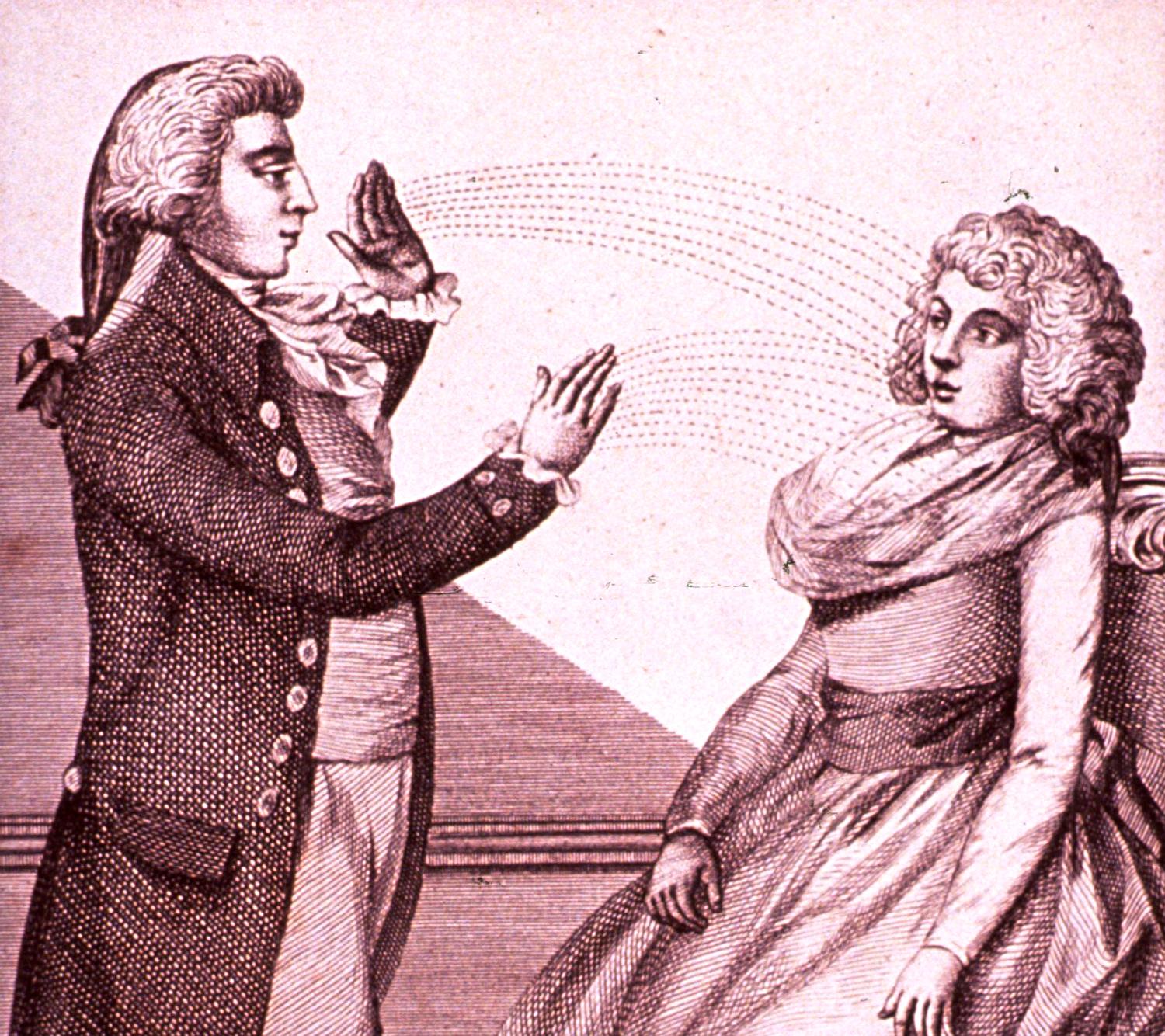 |
The reality is, there's a mixed
argument taking place here, due to the obvious glaring fact that those who do
go to a hypnotist are going with the express intention of
working with the hypnotist
to be hypnotized. They are trying very hard to focus their
mind, so that they can actually achieve a trance state. They are
not trying to be resistant.
Second, the truth of the matter is,
realistically, anyone can be hypnotized.
|
This topic has long been a source of
much contention amongst hypnotists, who, it should be noted, generally have
vastly different skill levels from one to the other, which very much needs
to be considered as case trials are compared and scrutinized in regards to
this claim. It also needs to be recognized that past studies on
hypnosis suggestibility have clearly not captured the entirety of the
issue. At present, these studies are still very much considered open for
debate.
From what researchers appear to agree
on, statistics say that roughly 10-15 percent of people are highly
hypnotizable. There is thought to be a similar proportion for those who are
less hypnotizable, while all others fall somewhere in-between at roughly
70-80 percent of the population. (The research varies.)
It doesn't take a lot of rocket science to understand that if someone is
purposefully tuning out or ignoring
verbal hypnotic suggestions, so as not to fall into trance, then they
probably won't be hypnotized.
The reality though is this - pretty much anyone can resist direct suggestion if
they want to. Even a somnambulist could resist verbal suggestions, if
they were aware and consciously worked at it. (As shown by Erickson's
somnambulist experiments.)
To claim that someone is non-hypnotizable
just
because they are able to resist direct suggestion or are
incapable of focusing on hypnotic suggestion is not an accurate measure
of non-hypnotizability. It simply means that suggestion doesn't work
for them. For the record, being resistant to suggestion
is far different than being incapable of trance. Also, for the
record, trance is not abnormal to the human animal. Trance is a
normal brain function. Daydreaming is a very good example.
So to say that someone can't be hypnotized
- based solely off the fact that they don't react to (or are
able to resist) direct verbal suggestion - is for all intents and purposes, a
somewhat disingenuous proffer to make in regards to non-hypnotizability.
While it is true that some people can actually be more
resistant than others to hypnotic suggestion, (possibly because they
don't want to be hypnotized, don't trust the hypnotist, or simply because
they are not able to focus properly), that still does not 100-percent mean they can't
be hypnotized.
The reality is, there are many ways to
hypnotize someone into trance. It's just a simple matter of
'how to do it' for those particular people, because
there are indeed many ways to achieve trance. For some people, just employing a
different hypnosis technique, or perhaps an entirely new approach, is all it
takes. The truth is, there are numerous ways to induce a hypnotic
trance, such as an unexpected shock, confusion, or even sensory overload, to
name but just a few.
As a matter of fact, a
2018
study headed by professor Max Colheart was able to increase
the hypnotizability of some people through the use of
Transcranial Magnetic
Stimulation (TMS). It was found that this disrupted activity in part of the
brain, increasing the subject's ability to be hypnotized.
(Another potential aid is
Hemispheric Sync , first developed by the Monroe Institute.)
To suggest that there are people who
cannot be hypnotized (in any way) is to suggest that some people are physically/mentally
incapable of reaching trance. This theory would appear to be antithetical to the human system,
because trance very much appears as a normal part of everyday human life.
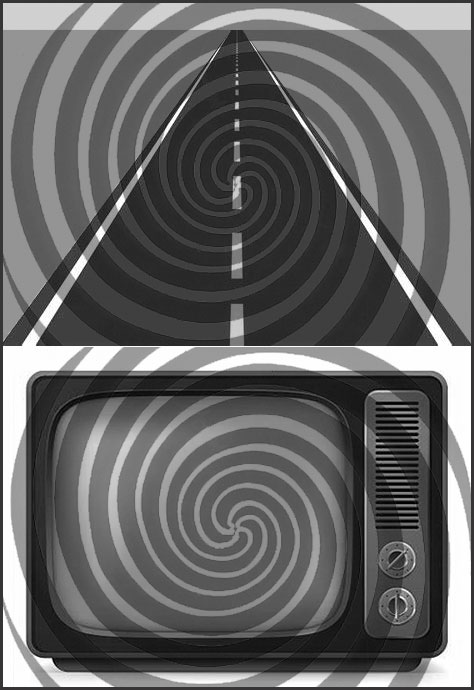 To
make such a bold claim of non-hypnotizability
is to suggest that there are some people who are totally immune to
highway hypnosis. It would also imply that there are those who are
absolutely immune to
TV hypnosis, where the brain literally flips (involuntarily) from
cognizant beta waves, to much slower alpha waves, within :30 seconds of
turning it on. The reality is, there have to be mental avenues to trance
for everyone, because it clearly appears to be a necessary function of the human brain.
The sad fact is, after over 200 years, we still don't understand hypnosis or
trance very well. To
make such a bold claim of non-hypnotizability
is to suggest that there are some people who are totally immune to
highway hypnosis. It would also imply that there are those who are
absolutely immune to
TV hypnosis, where the brain literally flips (involuntarily) from
cognizant beta waves, to much slower alpha waves, within :30 seconds of
turning it on. The reality is, there have to be mental avenues to trance
for everyone, because it clearly appears to be a necessary function of the human brain.
The sad fact is, after over 200 years, we still don't understand hypnosis or
trance very well.
[See more:
Highway Hypnosis |
What is Highway Hypnosis? |
Television Trance
]
With all of that said, surprisingly
there are still many who are willing to adamantly decree
that trance is not possible for everyone, despite the limited testing and
lack of significant sample size for many experiments.
According to author, Saul Marc
Rosenfeld, "Not only have investigators, on the whole, been content to
limit their efforts to one or two hasty trials before writing someone off as
"unsusceptible," but some even went so far as to claim that research studies
had conclusively demonstrated that there was no advantage to be gained from
offering subjects more time to respond."
"Such claims are boldly asserted but never convincingly shown, for although
a few comparative studies have been made in which people were exposed to
inductions of varying length, close analysis of the procedures used reveals
that there was less to these studies than meets the eye, and that they were
therefore doomed from the start." -
A Critical History of Hypnotism.
Until this issue can be proven
conclusively through large clinical trials, (those which exhaust
all
hypnosis techniques in the process), it has to be assumed that even the most
resistant subject can be hypnotized. (And yes, drugs are an option
for this.
Scopolamine is
said to work especially well for hypnosis.)
There are recent studies that say
1-in-5 are not hypnotizable, but the key is, what was the technique used
to ascertain this? To be fair, the number of hypnosis
techniques used to ascertain non-hypnosis is the primary question, as well as
the total effort expended on each subject. The results of these tests do
merit further research, however, using a much deeper base sample to reduce
the margin of error and thus gain better statistical corroboration, but most
importantly of all, employing the most thorough array of deep hypnosis techniques
possible. This is absolutely a critical necessity. Until then, it just seems
very disingenuous to
say that some people absolutely cannot be hypnotized,
yet the argument rages on.
Five-star generals have reportedly been
reduced to babbling adolescents at the snap of a finger and a well timed
hypnotic command. No one appears 100% immune to hypnotic suggestion.
Again, see more on the MKULTRA program.
 Perhaps
the best recourse here is to recall the
chilling comments of
George H. Estabrooks, considered by many to be the father of the CIA's
use of hypnosis. Estabrooks is remembered for having said, “I can hypnotize a man, without his
knowledge or consent, into committing treason against the United
States.” He made this extremely alarming comment in the early 1940s. Perhaps
the best recourse here is to recall the
chilling comments of
George H. Estabrooks, considered by many to be the father of the CIA's
use of hypnosis. Estabrooks is remembered for having said, “I can hypnotize a man, without his
knowledge or consent, into committing treason against the United
States.” He made this extremely alarming comment in the early 1940s.
In his 1943 book titled Hypnotism,
Dr. Estabrooks stated conclusively that by using a covert technique of
relaxation, people could be hypnotized without actually knowing what is
happening to them. Again, this was in the early 1940s.

The truth is, there are some
people who
can be (or
are) more resistant to hypnosis suggestion, but that does not mean
they are totally immune to
trance. Again, a different hypnotic method can make all the difference
in the world.
Hypnosis legend Albert Moll once said,
"A person who is easily hypnotized can be hypnotized by anyone, but one
who is hypnotized with difficulty can only be thrown into hypnosis by a good
experimenter."
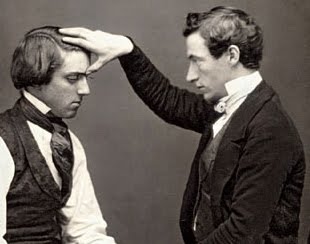 In contrast, there are those
who are much more susceptible to hypnotism than others.
Those who are evaluated as "somnambulistic" are far easier
to put under and to take into deep coma states (the Esdaile state).
Such people are extremely vulnerable to hypnotism and they take well
to post-hypnotic suggestion, more so than others, and as such they
are the perfect candidates for hypnotic programming and psychological
brainwashing. In contrast, there are those
who are much more susceptible to hypnotism than others.
Those who are evaluated as "somnambulistic" are far easier
to put under and to take into deep coma states (the Esdaile state).
Such people are extremely vulnerable to hypnotism and they take well
to post-hypnotic suggestion, more so than others, and as such they
are the perfect candidates for hypnotic programming and psychological
brainwashing.
As a matter of fact,
there have been
studies that suggest physical differences in the brains of those who can
be hypnotized, such as a larger rostrum (an increased size in the anterior corpus callosum), but even studies
such as these have been limited in their scope and
will require much further testing, with an even larger sample base for
better statistical accuracy and reliability.
In the 1989 book Open to Suggestion:
The Uses and Abuses of Hypnosis, author Robert Temple writes the
following,
"For we know from many studies that approximately five-percent of the
population are so hypnotizable that practically anything can be done with
them, and that they can be hypnotized without knowing it or against their
will. It is these people who are at risk in society from the abuses of
hypnosis."
So, if you're a devious hypnotist,
your primary goal is to find someone who is highly somnambulistic,
because they're easiest to put into a deep trance. The
success rate increases exponentially when finding someone like
this.

There are many ways to put someone
under using hypnosis. It does not have to be the typical, "watch the
swinging pendulum" to enter into a hypnotic state.
There are other techniques, such as...
-
A deliberate staring gaze
-
Conversational hypnosis
-
Handshake rapid induction
-
Ambiguity / confusion method
-
Pulsing sound and/or vibration
-
Pulsing, flashing, strobe lights
-
Visual fixation upon an object
-
Mental fixation with an image
-
Unexpected shock w/ suggestion
(same principle as handshake induction)
Those are but just a few examples, but
the fact of the matter is this... if you're human, you can be hypnotized.
Like it or not, it all simply comes down to the inferior nature of the human
animal.
As a species, the human mind is innately susceptible to covert
subconscious suggestion, and is even more vulnerable when placed
under sensory overload conditions. It is an inherent biological
component of being human. As a matter of fact, noted hypnotist Dave Elman states that a complete induction of profound hypnotic states should
never take more than one or two minutes. That really says a lot as to how
susceptible we are as a species.
Make no mistake about it, the human mind can be put into a deep
trance state,
much easier than most might think or ever suspect.
Sadly enough, it is what it is. We are
not omnipotent as mortal beings. We have inherent built-in vulnerabilities
and limitations that are all part of being human.
So, how can people truly feel safe,
comfortable and confident using hypnosis, when the one thing they cannot
control is the hypnotist's own morality?
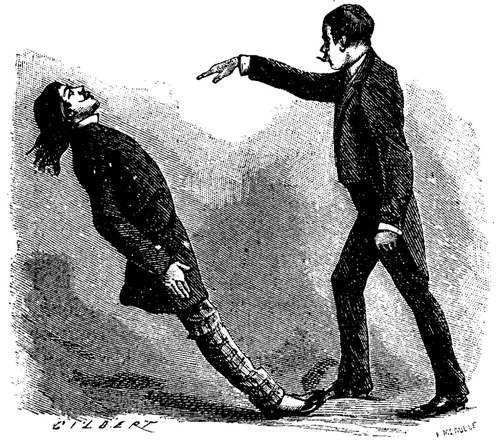 |
The cold hard reality of hypnotism
is basically this... the hypnotic subject is clearly at the mercy of the moral
piety of the hypnotist. Trust is the absolute biggest key
component of hypnotism, to know that you will be responsibly
and respectfully cared for while under its effect, however, when
the moral compass of the hypnotist swings wildly askew, then the subject
becomes at great risk and in grave danger of being psychologically
controlled and/or abused. |
For these reasons, the hypnosis
profession faces daunting challenges that need to be addressed and overcome
before being truly trusted by the greater populace.

The one thing that some hypnotists are
resistant to is indeed the one thing that would effectively give immediate
credibility and credence to the hypnosis profession - that of
a video recording of each hypnosis session. Due to the
power of hypnosis, and because of those who have abused it, this is
something that will have to become standard within the profession, before
people fully embrace the medium comfortably, with complete confidence.
To argue against such a safeguard is to completely ignore all past
criminal history, and would be tantamount to more encouragement of
a reckless environment of endangerment, raising serious
questions about unethical professional standards.
One might think that the best solution
is to only allow trained medical professionals to do hypnosis, but yet
doctors, dentists, nurses, psychiatrists, psychologists, and even pharmacists have already abused the field
of hypnosis as much as the criminal hypnotist. As a matter of fact, this perverse sexual
exploitation even extends to lawyers who should legally know better, and
surprisingly enough, to clergyman who should morally know better. (See list
>)
So the
question is... who can you possibly
trust to do hypnosis?!
There is much frustration in asking
such a
question, as it is somewhat rhetorical in nature. To be fair,
not all hypnotists are sexual predators. Far from it. The crux of the
problem though is this:
deviant hypnotists have been enabled by the reputable
hypnotists,
those who keep saying that hypnosis abuse is not possible. By
perpetuating the incorrect notion that hypnosis rape is not possible, it gives a false perception to the public that they
will be safe doing hypnosis,
and thus lulls many into a dangerous false sense of security. This, hands-down,
unequivocally, creates the perfect environment for abuse by deviant
hypnotists.

If the hypnosis profession wants to be taken seriously, they need to own up to
the true power of hypnosis, and then start from within to clean up a mess
that they've spent decades helping create through
persistent disinformation. They have
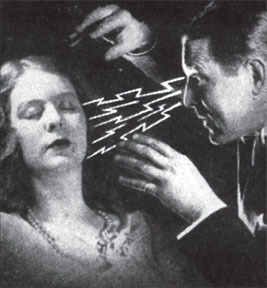 unwittingly
crafted
the absolute perfect environment for abuse, by forever
insisting that such hypnotic deviancy is not possible. It's their lies that
enable this, by creating the unsafe environment for the unscrupulous
hypnotist to exploit. Those who continue to perpetuate the lie that hypnosis
abuse is not possible should be held legally responsible as
accessories to the crime, because they help create and foster an unsafe
environment based on their false testimony of hypnosis. It's no
different than if a particular drink had poison in it, and you told someone
it was okay to drink, and then they got sick or died. You have to expect
legal repercussions for such an irresponsible, reckless act. The hypnosis
profession
needs to come clean about the true dangers of bad hypnotists, or perhaps
suffer a most deserved fate of endless lawsuits from its countless victims,
for too many years of silence and complicity. unwittingly
crafted
the absolute perfect environment for abuse, by forever
insisting that such hypnotic deviancy is not possible. It's their lies that
enable this, by creating the unsafe environment for the unscrupulous
hypnotist to exploit. Those who continue to perpetuate the lie that hypnosis
abuse is not possible should be held legally responsible as
accessories to the crime, because they help create and foster an unsafe
environment based on their false testimony of hypnosis. It's no
different than if a particular drink had poison in it, and you told someone
it was okay to drink, and then they got sick or died. You have to expect
legal repercussions for such an irresponsible, reckless act. The hypnosis
profession
needs to come clean about the true dangers of bad hypnotists, or perhaps
suffer a most deserved fate of endless lawsuits from its countless victims,
for too many years of silence and complicity.
Sadly, even if the profession was
willing to change, none of this will ever happen overnight. It's going to be
very painful for many professionals to admit the truth.
Best advice: if you want 100%
assurance of safety, you should always have the
hypnosis session video taped. Most smart phones have the capability
to do this. No one should ever subject themselves to hypnosis without a
video record of the session.
[ 1) A witness could also be hypnotized, 2) audio doesn't
reveal everything. ]
This is undeniably the safest recourse
to take, for both the client and the hypnotist. If the hypnotist refuses,
walk out immediately and seek another hypnotherapist. Don't ever accept
their unverifiable verbal assurance when you already have the best viable
insurance possible, a video record of the session.
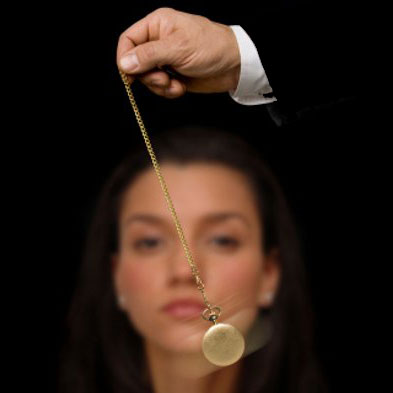 The
information on this website is meant to serve as direct evidence
that hypnosis is indeed real
and it does work. It should enlighten all who doubt the power
of hypnotism, from the innocently naive to the most arrogant of the
ignorant. (Although you truly never can be free of those who stubbornly
and willfully wish to remain as reasoning-handicapped over hypnosis and its
true medical viability.) The
information on this website is meant to serve as direct evidence
that hypnosis is indeed real
and it does work. It should enlighten all who doubt the power
of hypnotism, from the innocently naive to the most arrogant of the
ignorant. (Although you truly never can be free of those who stubbornly
and willfully wish to remain as reasoning-handicapped over hypnosis and its
true medical viability.)

In summary: this effort isn't
meant to damn hypnosis, just the bad hypnotists. Hypnosis can be,
and is,
a very beneficial tool to help aid people in life, when it is
used benevolently. It already accomplishes this through many helpful
programs, such as weight loss, stop-smoking programs, and even post
traumatic stress syndrome (PTSD), to name but just a few of the
ethical uses.
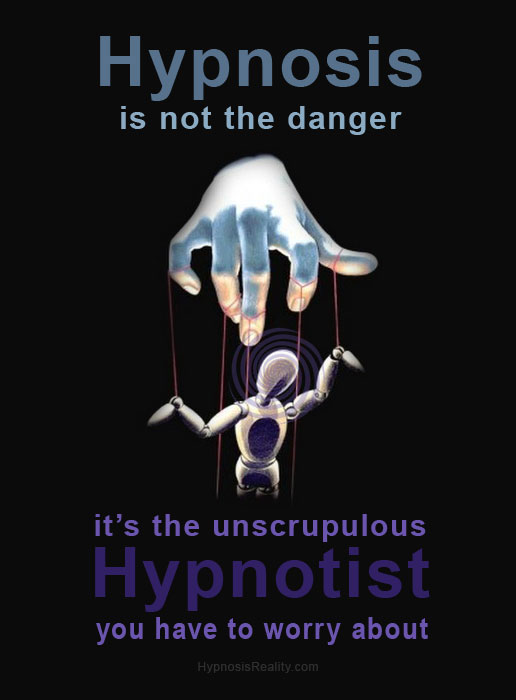 The caveat to this would be
the fact that
hypnotism can also be one of the most dangerous threats to humankind,
if used with malevolent intent by those with unscrupulous or immoral
character, particularly those in leadership positions. The caveat to this would be
the fact that
hypnotism can also be one of the most dangerous threats to humankind,
if used with malevolent intent by those with unscrupulous or immoral
character, particularly those in leadership positions.
As evidenced by the numerous accounts
listed on this page, it is still being used today by very devious men to
exploit innocent, trusting, women and children. The list of abusers on
this web page alone should make this point crystal clear to anyone. Society
has a very serious yet unknown problem; deviant hypnotists.
The bottom line is this:
there need to be new laws that recognize and deal with this specific type of
crime, otherwise it will only continue on and get worse.
May the evidence presented on this
site stand as testament to the true power of hypnosis
and the danger it presents to many,
when used in the wrong hands. Let the truth stand in contempt and
defiance of any further duplicity.

Charcot demonstrating hypnosis on a "hysterical"
Salpêtrière patient, Blanche
(Blanche Wittmann), who is supported by Joseph Babiński. (Wikipedia) |